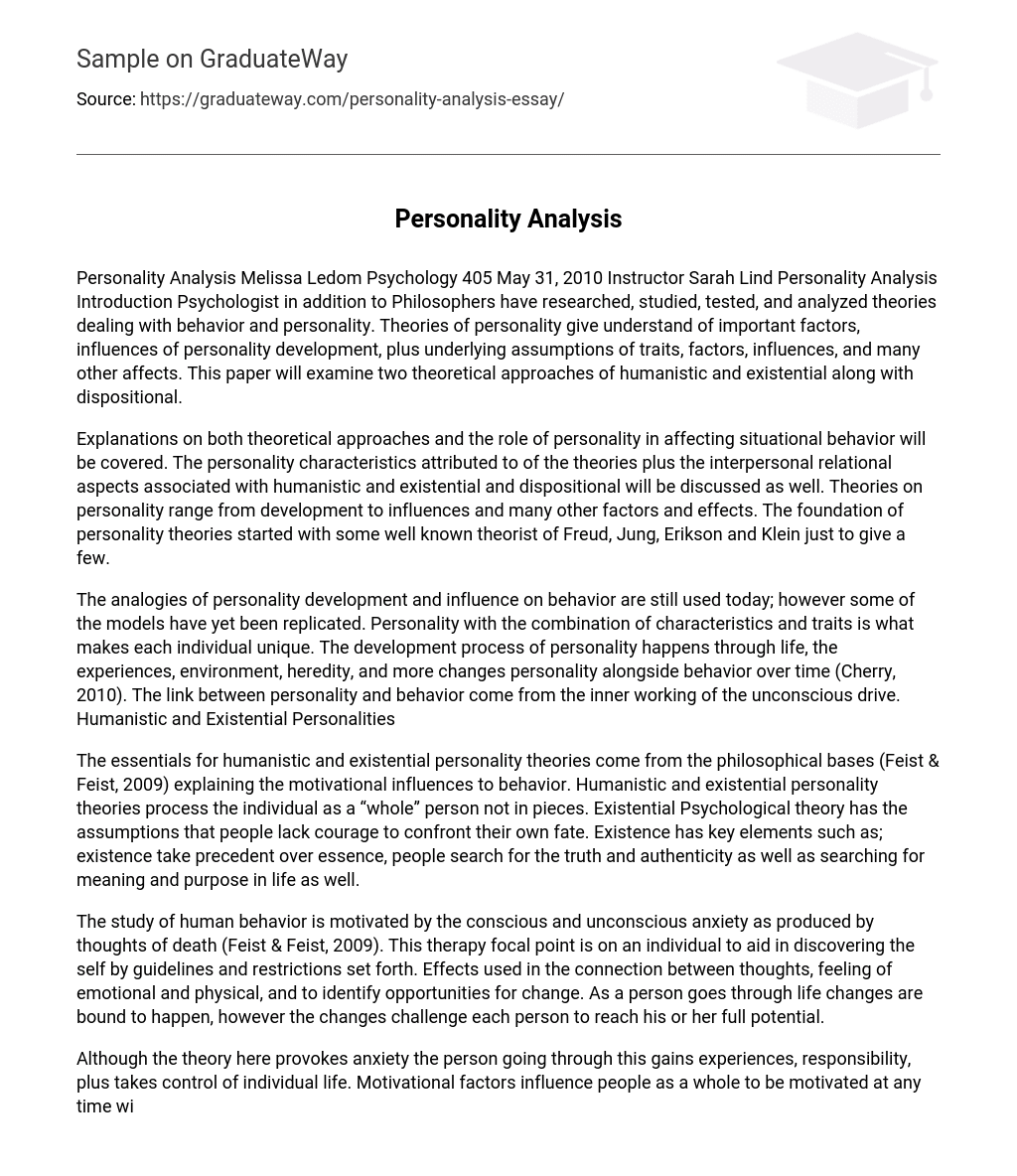Psychologist in addition to Philosophers have researched, studied, tested, and analyzed theories dealing with behavior and personality. Theories of personality give understand of important factors, influences of personality development, plus underlying assumptions of traits, factors, influences, and many other affects. This paper will examine two theoretical approaches of humanistic and existential along with dispositional.
Explanations on both theoretical approaches and the role of personality in affecting situational behavior will be covered. The personality characteristics attributed to of the theories plus the interpersonal relational aspects associated with humanistic and existential and dispositional will be discussed as well. Theories on personality range from development to influences and many other factors and effects. The foundation of personality theories started with some well known theorist of Freud, Jung, Erikson and Klein just to give a few.
The analogies of personality development and influence on behavior are still used today; however some of the models have yet been replicated. Personality with the combination of characteristics and traits is what makes each individual unique. The development process of personality happens through life, the experiences, environment, heredity, and more changes personality alongside behavior over time (Cherry, 2010). The link between personality and behavior come from the inner working of the unconscious drive. Humanistic and Existential Personalities
The essentials for humanistic and existential personality theories come from the philosophical bases (Feist & Feist, 2009) explaining the motivational influences to behavior. Humanistic and existential personality theories process the individual as a “whole” person not in pieces. Existential Psychological theory has the assumptions that people lack courage to confront their own fate. Existence has key elements such as; existence take precedent over essence, people search for the truth and authenticity as well as searching for meaning and purpose in life as well.
The study of human behavior is motivated by the conscious and unconscious anxiety as produced by thoughts of death (Feist & Feist, 2009). This therapy focal point is on an individual to aid in discovering the self by guidelines and restrictions set forth. Effects used in the connection between thoughts, feeling of emotional and physical, and to identify opportunities for change. As a person goes through life changes are bound to happen, however the changes challenge each person to reach his or her full potential.
Although the theory here provokes anxiety the person going through this gains experiences, responsibility, plus takes control of individual life. Motivational factors influence people as a whole to be motivated at any time with needs starting at a low level. Lower level consist of hunger, thirst, and love which have to be satisfied first before starting on the higher level needs. Maslow had a theory that dealt with reaching self actualization resulting in acceptance and self fulfillment (Fist & Feist, 2009). Different levels of needs are a guide for people to use in reaching self actualization.
People need motivation to improve life, to reach goals and become a better happier person. The achievements people experience allow for individuals in living up to his or her fullest potential. Although people search and experience many emotional feelings one has to remember that self perception is a factor as well. How a person views themselves will have influence on the behavior and personality as well in acceptance. Dispositional Allport assumed personality was a combination of physical and psychological attributes.
He believed that personality is a product and process that allows individuals to make choices. Since every individual is unique in every way the characteristics and traits that each person possess makes him or her who they are. Trait and factor theory consist of these factors of extroversion, introversion, openness, agreeableness and conscientiousness. Canttell’s had is 16 personality factor based off of Costa and McCrae five factors consisting of extroversion, introversion, openness, agreeableness and conscientiousness (Feist & Feist, 2009).
These models have been difficult to repeat and while the 16 factors have not been done only the five factors really stand out. The influences on behavior and personality come from several aspects but the important one is the environment. In conclusion a person has motivational factors based off of the lower level needs and higher level, lower level being satisfied first in order for a person to begin on the higher level. When at the point of higher level needs being meet a person also is learning and acceptance of his or her self.
Maslow had the assumption of self actualization that results in self acceptance. Existential theory is on the assumption that human behavior is motivated by conscious and unconscious feelings. This therapy is only successful when a person reaches his or her full potential. Allport felt that personality is combined of physical and psychological components to behavior. He also thought that people and personality changes as the person grows from experiences.
Then Costa and McCrae developing the five factors figuring that personality is influences by many factors that then influences behavior. Last personality is what makes the person who they are a unique individual.
References
- Cherry, Kendra, (2010). Theories of Personality: Personality Psychology Study guide. Retrieved May 16, 2010 from http://psychology. about. com/od/psychologystudyguides/a/personalitysg_3. htm
- Feist G. and Feist J. (2009) Person-centered Theory; Theories of Personality retrieved online on May 21, 2010 from University Of Phoenix e-book collection





